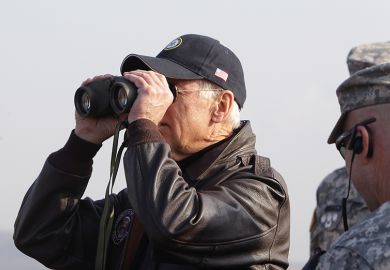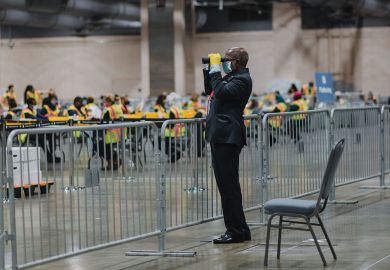The US government has failed to convict a University of Tennessee engineer in the first Trump-era prosecution of academic researchers with ties to China, after an FBI agent admitted it had tried to get him to spy for the US.
The federal judge overseeing the trial of the Chinese-born lecturer, Anming Hu, declared a mistrial after jurors told him that they could not reach a unanimous verdict on charges of wire fraud and making false statements.
The ruling by US District Court Judge Thomas Varlan means that Dr Hu is neither convicted nor acquitted, leaving prosecutors to decide whether to seek a new trial or drop the case.
Dr Hu, whose case was the first to reach trial, was among dozens of academics accused, fired or arrested as part of a Trump-era push to root out what it portrayed as a widespread and dangerous level of secretive Chinese influence in academia.
The prosecution of the 52-year-old naturalised Canadian citizen instead featured an FBI agent, Kujtim Sadiku, admitting to the court that it was his agency had asked Dr Hu to spy on China for the US.
After Dr Hu refused, the FBI started a surveillance campaign lasting nearly two years, Mr Sadiku told the court.
Even before that, many in academia had questioned the overall merit of the Trump administration’s approach. Government officials – including top leadership of the National Institutes of Health, the biggest supplier of basic research funding to US universities – argued that their pursuit of scientists such as Dr Hu was justified in the name of fiscal responsibility, to prevent them from taking NIH money while China paid them for the same work. NIH officials acknowledged, however, that they were not devoting such attention to possible double-dipping that involved only US sources of funding.
In the case of Dr Hu, prosecutors accused the accomplished laser engineering expert of hiding from his university and from the US space agency Nasa his work with the Beijing University of Technology.
In a bid to prove prove that Dr Hu had not been trying to hide his affiliations, his defence lawyer produced a letter from a scientist at Beijing University, describing his long-term collaboration with Dr Hu, that Dr Hu had earlier given to officials at both Nasa and the University of Tennessee.
The federal government is still pursuing other high-profile cases against academic scientists who deny misleading their institutions or their funders about their work with China.
They include Charles Lieber, the former chair of the chemistry department at Harvard University, and Gang Chen, a professor of mechanical engineering at the Massachusetts Institute of Technology.
MIT has promised to legally defend Professor Chen, while Professor Lieber has been suing Harvard to do the same. Leaders across US higher education more broadly have been cautious towards such cases, generally avoiding comment on specific individuals while repeatedly making clear their agreement with the FBI that Chinese spying is a legitimate and serious concern.
Register to continue
Why register?
- Registration is free and only takes a moment
- Once registered, you can read 3 articles a month
- Sign up for our newsletter
Subscribe
Or subscribe for unlimited access to:
- Unlimited access to news, views, insights & reviews
- Digital editions
- Digital access to THE’s university and college rankings analysis
Already registered or a current subscriber?








